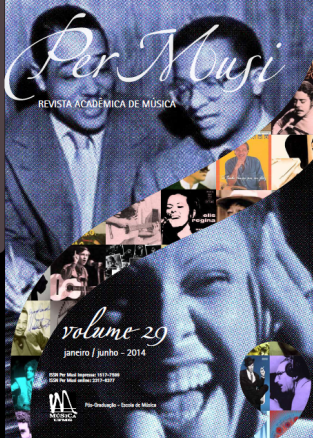Música e política no surgimento da Bossa Nova
Palavras-chave:
Estética, Política, Bossa NovaResumo
Este artigo focaliza a análise do álbum Chega de saudade, do violonista brasileiro João Gilberto, lançado em 1959. Por um lado, analisamos questões formais como o ritmo, a construção harmônica e melódica, o papel da voz de Gilberto na construção harmônica e melódica, e todas as inovações estéticas que o disco introduziu. Por outro lado, e de forma mais ampla, através de uma contextualização das discussões políticas do período, o artigo avança um problema fundamental para a música do século XX: o problema da relação entre a estética e a política. O trabalho é baseado na renovação estética introduzida pela Bossa Nova, e nos discursos contra ela, que a acusavam de ser "reativa", "música burguesa", etc., a fim de pensar no lugar onde se encontra a política da música popular.
Referências
CASTRO, R. (2008). Chega de saudade. A história e as histórias da Bossa Nova. São Paulo: Companhia de Bolso.
DE CAMPOS, A. (2006). Balance(o) de la Bossa Nova y otras bossas. Buenos Aires: Vestales.
DELEUZE, G. y GUATTARI, F. (1993). ¿Qué es la filosofía?. Barcelona: Anagrama.
GAVA, J.E. (2008). A linguagem harmônica da Bossa Nova. São Paulo: Editora UNESP.
GUARNIERI, C. (1950). Carta abierta a todos los músicos y críticos musicales de Brasil. O Estado de São Paulo. São Paulo: 17 de diciembre de 1950.
MEDÁGLIA, J. (2011), Entrevista con Arrigo Barnabé en programa radial Supertônica. Um programa sobre o gosto, Rádio Cultura Brasil, 07/01/2011 (disponible online en http://www.culturabrasil.com.br/programas/supertonica/arquivo-11/caetano-veloso-1968-por-julio-medaglia-2)
NEVES, J.M. (1981). Música contemporânea brasileira. São Paulo: Ricordi Brasileira.
STREGA, E. (2009). Bossa Nova y Nuevo Tango. Una historia de Vinicius a Ástor. Buenos Aires: Corregidor.
VELOSO, C. (2004). Verdad tropical. Barcelona: Salamandra.
ZÉ, T. (2011), Entrevista con Arrigo Barnabé en programa radial Supertônica. Um programa sobre o gosto, Rádio Cultura Brasil, 04/02/2011 (disponible online en http://www.culturabrasil.com.br/programas/supertonica/arquivo-11/chega-de-saudade-por-tom-ze-3)
Downloads
Publicado
Edição
Seção
Licença

Este trabalho está licenciado sob uma licença Creative Commons Attribution 4.0 International License.

Exceto onde está indicado, o conteúdo neste site está sob uma Licença Creative Commons - Atribuição 4.0 Internacional.












